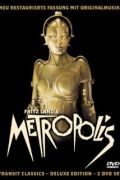
Directed by
Fritz Lang
153 minutes
Rated G
Reviewed by
Bernard Hemingway


Metropolis (Restored Version)
Synopsis: Metropolis is a city built on the ceaseless toiling of a mass of workers who live underground and who are only identified by numbers. Above ground, a ruling class disport themselves with feckless pleasure. The city is the brainchild of a single man, Joh Fredersen (Alfred Abel) assisted by the bitter and twisted Rotwang (Rudolph Klein-Rogge). When his son, Freder, meets Maria, one of the workers, he realizes the injustice on which his life is based and sets about helping her to liberate the workers. His father has other ideas.“Masterpiece” is a word of which I am very wary but Fritz Lang’s visionary film deserves it. The most expensive silent film ever produced, it is a superb mix of big production vision, Expressionist style and mythic themes and even given its dated qualities, remains a film with few peers. Rather surprisingly in its day it failed to strike a chord in its home market and nearly bankrupted its studio, UFA, which in a not unusual move, re-edited it, cutting it from153 minutes to approximately 90 creating a version by which it was known to modern audiences until a 16mm negative of the original version was found in Buenos Aires in 2008. A restored and reconstructed version was released in 2010
The restored version does not substantially alter the plot although the long-standing rivalry between Fredersen and Rotwang, occasioned by their love of the same woman, now occupies a much more substantial part of the story.. It is, however, the ambitious scale of Lang’s vision, magnificently abetted by Eugene Schufftan’s special effects, Karl Freund's cinematography and the restoration of the original 1927 score by Gottfried Huppertz (there was an execrable colourised version with an 1980s pop soundtrack by Queen and Giorgio Moroder that has nothing to do with restoration).that makes this one of the masterworks of cinema history and whose influence stretches from Charlie Chaplin's Modern Times (1936) to distant descendants like The Matrix (1999) (Rotwang's robot was the inspiration for the design of Star War's C-3PO)
FYI: Author/scriptwriter Thea von Harbou, Lang's wife at the time, became a Nazi sympathiser (the pentagram on Rotwang's door is readily recognizable as a Jewish symbol) and Hitler considered Lang worthy of taking over German film production, a position Lang declined, emigrating to America in the early '30s, without von Harbou, where his influence on film noir was considerable although his light never shone so bright again.
Show detailed review
Want something different?





